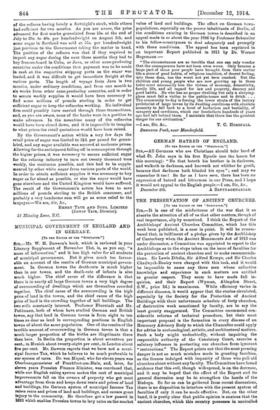GOVERNMENT BUYING OF SUGAR.
[To TIM EDITOR or TR1 "SrECTATOR."]
Sur.,—In your issue of December 5th you refer in an article on "The Waste of War" to the action of the Government in regard to their operations in sugar, and we do not think you quite realize the position of the market during the first three months of the war. Immediately war was declared all con- tracts for beet which had been bought for the United Kingdom for shipment from the Continent, amounting to thousands of tons, were cancelled, and at the most there was only about six weeks' stock of sugar in this country. This, of course, was spread unevenly over the various industries; for instance, some
of the refiners having barely a fortnight's stock, while others bad sufficient for two months. As you are aware, the price advanced for first marks granulated from 15s. at the end of July to 35s. to 40s. per hundredweight on August 5th, and some sugar in Scotland was sold at 55s. per hundredweight just previous to the Government taking the matter in hand. The position of the refiners was that if they required to import any sugar during the next three months they had to buy free-on-board in Cuba, or Java, or other cane-producing countries under the conditions that payment was to be made in cash at the respective shipping ports as the sugar was loaded, and it was difficult to get immediate freight at the various ports. The length of voyage from Java is two months, under ordinary conditions, and from one month to six weeks from other cane-producing countries, and in order to secure weekly supplies it would have been necessary to find some millions of pounds sterling in order to get sufficient sugar to keep the refineries working. No individual firm could possibly have carried through these transactions, and, as you are aware, none of the banks were in a position to make advances. In the meantime many of the refineries would have been closed down, and it is impossible to imagine to what prices the retail quotations would have been raised.
By the Government's action within a very few days the retail price of sugar was limited to 3jd. per pound for granu- lated, and any sugar available was secured at moderate prices. Allowing for the anticipated falling off in consumption through the higher prices, it was necessary to secure sufficient sugar for the refining industry to turn out twenty thousand tons weekly, the maximum possible, and this had to be supple- mented by other white sugar from various parts of the world. In order to obtain sufficient supplies it was necessary to buy sugar as far ahead as possible, or else the sugar would have gone elsewhere and the United Kingdom would have suffered. The result of the Government's action has been to save millions of pounds sterling to the British consumer, and probably a very handsome sum will go as some relief to the taxpayer.—We are, Sir, &c., HENRY TATE AND SONS, LIMITED (EDWIN Tare, Director).
21 Mincing Lane, E.C.















































 Previous page
Previous page